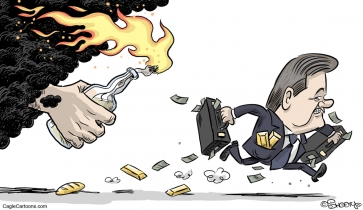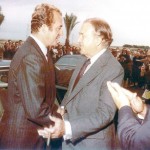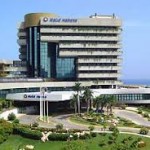Daniel Duquenal is the pen name of a Venezuelan blogger who has been writing his blog for 15 years in an effort to resist the Chavez-Maduro regime and expose its darkest aspects. For Duquenal, the regime is nothing more than a band of drug trafficking thieves who have perverted Venezuelan democracy in the name of the people for their own private benefit. For him, Venezuela has reached the breaking point or El Llegadero and he sees no hope for a peaceful transition.

Before being driven from power by angry crowds with nothing to lose, Ukrainian President, Viktor Yanukovitch and his cronies were systematically looting the country and increasingly bringing together the government and organized crime in what seems to me to be a new formula for authoritarian government. During the last century, authoritarian regimes could be classified as being to the left or the right.
Beyond Ideology and Nationalism
 Leftists dictators like Fidel Castro adopted a Marxist-Leninist ideology about redistributing the wealth and doing what is best for the nation in the name of the people. Rightist or nationalist dictators such as Augusto Pinochet siezed power to protect the people from the communists and focused on preserving the traditional values of the country and building the economy. Dictators who borrowed from both camps were often called populists but again did what they did for their understanding of what is good for the people.
Leftists dictators like Fidel Castro adopted a Marxist-Leninist ideology about redistributing the wealth and doing what is best for the nation in the name of the people. Rightist or nationalist dictators such as Augusto Pinochet siezed power to protect the people from the communists and focused on preserving the traditional values of the country and building the economy. Dictators who borrowed from both camps were often called populists but again did what they did for their understanding of what is good for the people.
Increasingly we are seeing the emergence of a new kind of Klepto-Dictatorships or what Foreign Affairs magazine calls, Mafia States, who appear to be beyond ideology and nationalism. They, like Chavez’ heir, Nicolás Maduro, may still make speeches in the name of the people but their actions and bank accounts tell a different story. Tyrants all across the political spectrum have enriched themselves and their families before but what appears to be different in the case of the Klepto-Dictators today is that they seem to place money and power before ideology and not the other way around.
In another post on Daniel’s web site, there is an interesting series of comments about the similarities and differences between Cuba and Venezuela and it seems to me that this is the essential difference. One may disagree deeply with the Castro brothers but even some of their harshest critics may grant that their basic motivation has been to help Cuba and its people and not to get rich.
The responsibility of business

In doing business around the world, companies have routinely tried to stay out of national politics and have worked with whatever government is in power. Ford , for example, first applied for permission from the Spanish government to build its assembly plant in Valencia in December, 1972. At the time, Spain was ruled by Francisco Franco and the Spanish economy was essentially sealed off from Europe.

A generation later, Spanish hotel groups and other companies regularly do business with Cuba despite the U.S. embargo that has persisted for over 50 years.
The issue is that while one can accept that multinational companies may choose to not mix business with politics and remain apolitical in terms of left v.s. right and even dictatorships v.s. democracies, It seems that the Mafia States pose a greater ethical dilemma.
Can companies turn a blind eye to doing business and paying taxes to governments whose fundamental reason for being is not the good of its people? Should shareholders tolerate such activity? Would withdrawing from such states help or hurt the people in the country and their chances for changing the situation?
How can we in academia and the business community help Venezuela as it reaches El Llegadero?

